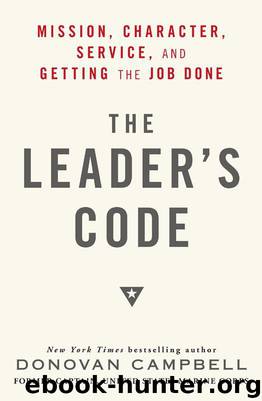The Leader's Code: Mission, Character, Service, and Getting the Job Done by Donovan Campbell

Author:Donovan Campbell [Campbell, Donovan]
Language: eng
Format: mobi
ISBN: 9780679644200
Publisher: Random House Publishing Group
Published: 2013-04-08T14:00:00+00:00
DISCIPLINE DEFINED
Most of us associate the word discipline with “punishment,” and so it has generally negative connotations. It was not always so. The word itself originates from the Latin disciplina, meaning “teaching” or “learning.” In thirteenth-century Middle English, the word discipline first entered the English lexicon. It was used as a reference to the systematic instruction given to pupils to train them in a craft or to teach them to follow a particular code of conduct or order. Merriam-Webster’s Collegiate Dictionary lists several definitions for the word, including “orderly or prescribed conduct or pattern of behavior” and “training that corrects, molds, or perfects the mental faculties or moral character.” Many people think that military discipline is just another form of extreme and unusual punishment, but that is not the case. When the Marines refer to discipline, they mean training and behavior. Over the past two centuries, the Corps has honed its training to a nearly exact science so that the behavior it produces will be as consistent as it is institutionally possible to achieve. The stakes are high. If the training fails and the resulting behavior is improper or inappropriate, then young men and women will die.
Because of this, the Marines hold their leaders to higher standards of discipline than they do the rank-and-file, and they train their leaders more extensively. Noncommissioned officers go to specific leadership schools as soon as they pin on their rank. Regular officers spend at least a year learning not only their specialty (infantry, artillery, supply, etc.) but also general leadership principles. They cannot afford to be undisciplined, and they cannot afford to fail.
In Iraq and later Afghanistan, I was supremely conscious that if I couldn’t demonstrate high standards of discipline, then the basic standards that I asked of my Marines would not be followed. When it came to discipline, I had to go above and beyond what was required of others. If I stopped cleaning my rifle every day, for example, my men would start doing the same, and when we most needed it, our equipment would let us down. When I failed, and fail I did, it was not I who suffered most. It was my men. Discipline was crucial to our survival, and I quickly learned that if the team was to embrace this characteristic, then the leader had to embrace it at a higher level.
Download
This site does not store any files on its server. We only index and link to content provided by other sites. Please contact the content providers to delete copyright contents if any and email us, we'll remove relevant links or contents immediately.
Rich Dad Poor Dad by Robert T. Kiyosaki(6632)
Bad Blood by John Carreyrou(6621)
Principles: Life and Work by Ray Dalio(6449)
Playing to Win_ How Strategy Really Works by A.G. Lafley & Roger L. Martin(6306)
Management Strategies for the Cloud Revolution: How Cloud Computing Is Transforming Business and Why You Can't Afford to Be Left Behind by Charles Babcock(4573)
The Confidence Code by Katty Kay(4260)
Thinking in Bets by Annie Duke(4227)
American Kingpin by Nick Bilton(3887)
Delivering Happiness by Tony Hsieh(3425)
Project Animal Farm: An Accidental Journey into the Secret World of Farming and the Truth About Our Food by Sonia Faruqi(3221)
The Power of Habit by Charles Duhigg(3139)
The Tyranny of Metrics by Jerry Z. Muller(3072)
The Marketing Plan Handbook: Develop Big-Picture Marketing Plans for Pennies on the Dollar by Robert W. Bly(3062)
Brotopia by Emily Chang(3056)
Mastering Bitcoin: Programming the Open Blockchain by Andreas M. Antonopoulos(3045)
I Live in the Future & Here's How It Works by Nick Bilton(2997)
The Content Trap by Bharat Anand(2927)
Building a StoryBrand by Donald Miller(2915)
Applied Empathy by Michael Ventura(2904)
